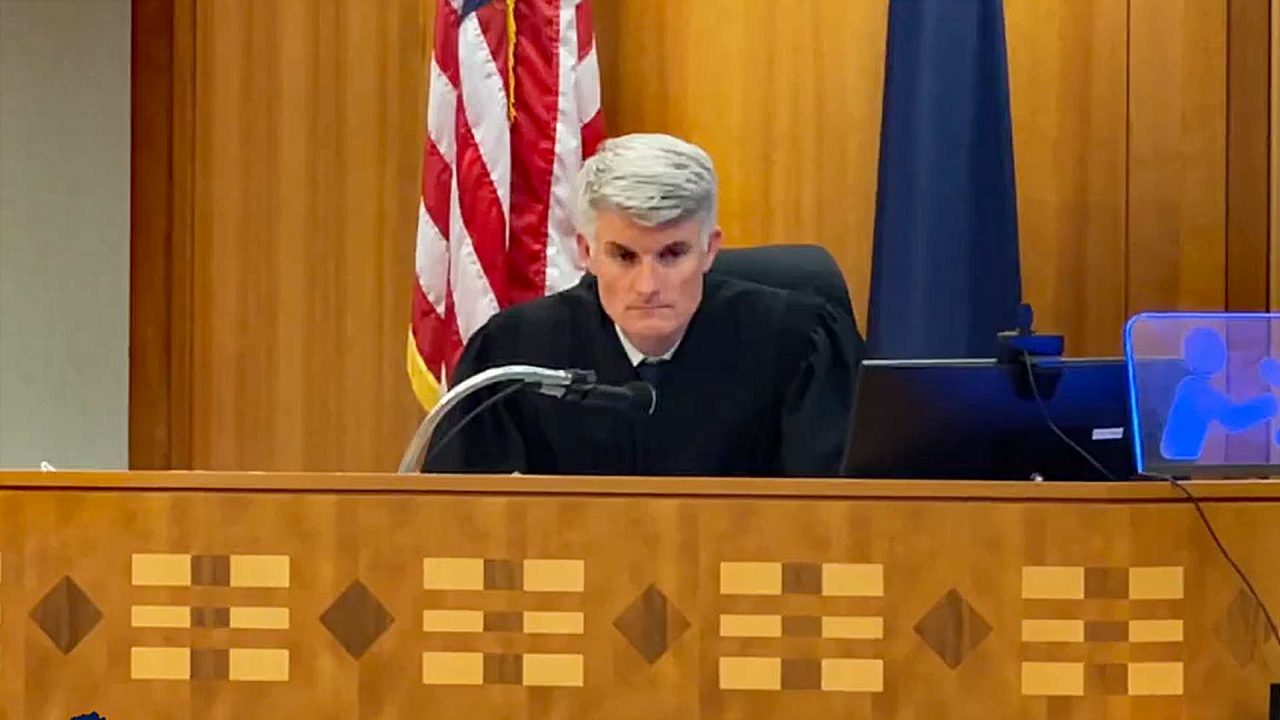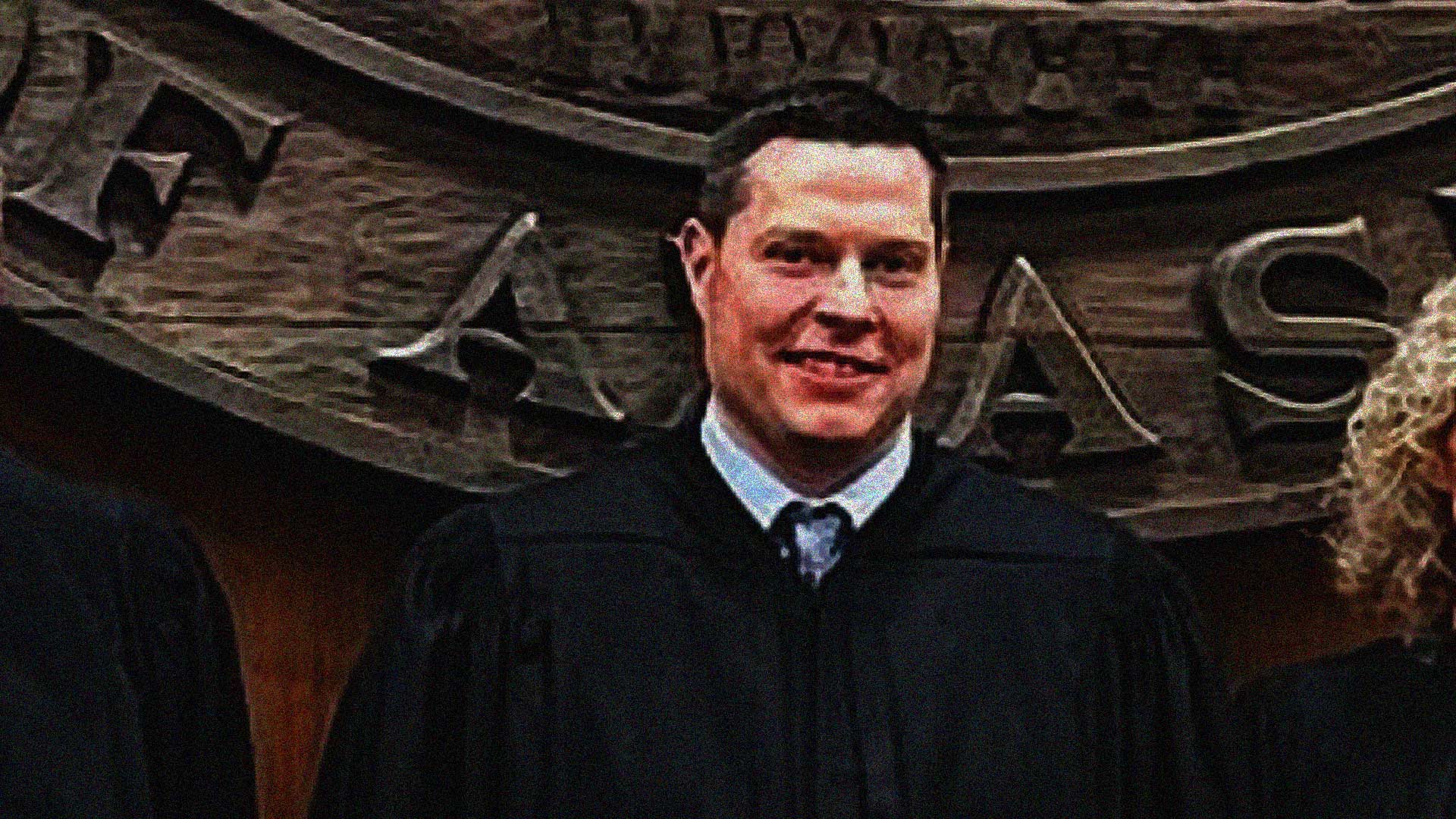

Anchorage Superior Court Judge Jack McKenna said on Dec. 8 that he will issue his decision Friday on whether to proceed with a case alleging that State Rep. David Eastman (R-Wasilla) is eligible to hold public office.
Eastman was reelected to the State House by Mat-Su voters in last month’s general election, but his victory has not yet been certified due to McKenna’s order that the state delay certification until after the case challenging his qualifications is resolved.
At issue is whether Eastman’s alleged membership in the Oath Keepers organization is sufficient to disqualify him from holding any public office in Alaska. The Alaska Constitution’s loyalty clause bars individuals from holding office if they belong to a group that “advocates the overthrow by force or violence of the United States or of a State.”
Former Mat-Su Assemblyman Randall Kowalke has brought the case against Eastman, asserting that Oath Keepers is an insurrectionist group. His allegation hinges on the fact that a small group within the larger organization was involved in violence that unfolded on Jan. 6, 2021, at the U.S. Capitol.
Last month, Oath Keepers’ founder, Elmer Stewart Rhodes III, was convicted of seditious conspiracy in connection with the Jan. 6 events, as was Kelly Meggs, the leader of the Oath Keepers’ Florida chapter. Three other members were found guilty of felony charges.

The group, however, is comprised of an estimated 38,000 members, many of whom include law enforcement officers, first responders and military veterans.
Eastman’s attorney, Joe Miller, has pointed out that Oath Keepers, as an organization, does not advocate for the violent overthrow of the government, and neither has Eastman. Furthermore, Eastman’s affiliation with Oath Keepers is tentative at best. He donated to the group in 2010 and received a “lifetime membership” certificate in the mail. Apart from that, he has never attended an Oath Keepers’ rally or event, but he also refuses to disavow the organization.
On Dec. 8, Miller told Judge McKenna that allowing this case to go to trial will set a precedent that will likely encourage many other similar lawsuits to be brought against legislators who affiliate with groups which contain some members who have acted violently against the government. He mentioned the 2020 violence perpetrated by members of Black Lives Matter as a case in point.
Furthermore, Miller argued that it is not the jurisdiction of the courts to determine whether an elected representative is eligible to serve in the State Legislature. That decision, he said, rests with the Legislature, which has constitutional authority to remove its members. Miller noted that the Legislature has long been aware of Eastman’s association with Oath Keepers and has declined to expel him.
Additionally, Miller cautioned against using the judicial branch to negate the will of voters. He said this would signal to Alaskans that “their votes don’t matter … we can make a decision outside of what the voters wanted.”
The Division of Elections, however, stands by its finding that Eastman was, in fact, a candidate in good standing, regardless of whether he is an Oath Keepers member.
Kowalke’s case also asserts that the Division of Elections failed in its role of determining the eligibility of Eastman to hold office. He argues that the agency should have prohibited Eastman from ever appearing on the ballot due to his Oath Keepers ties.
The Division of Elections, however, stands by its finding that Eastman was, in fact, a candidate in good standing, regardless of whether he is an Oath Keepers member.
Additionally, the division argues that it does not have the resources to gather evidence, subpoena witnesses and investigate allegations against organizations to determine whether membership within those groups violates the state’s loyalty clause.
Lael Harrison, an attorney for the Division of Elections, said on Dec. 8 that the state agency is not equipped with statutory authority or regulatory criteria for conducting such investigations.
Harrison maintains that the state properly fulfilled its role in determining that Eastman was qualified to run for office based on his residency, age and citizenship.
Judge McKenna acknowledged the predicament facing the Division, but also noted that the State Constitution does give it the authority to look into candidates’ qualifications to hold office. He said there is a “tension there.”
If Eastman is found to be ineligible to hold office, Judge McKenna has indicated that the Division of Elections should give his House seat to the runner up in District 27.
Kowalke’s attorney, Goriune Dudukgian, maintained that the Division should have done more research, and claims it could have utilized other branches of government to gather evidence, but chose not to.
If McKenna allows the case to go to trial, Kowalke must prove that Oath Keepers – as an organization – does, in fact, formally advocate for the violent overthrow of the government, that Eastman is an official member of the organization, and that the state was wrong to approve his application to run for office.
Harrison said McKenna could dismiss the claims against the Division of Elections. If he did, the Division would certify Eastman’s victory in District 27, while the other claims against Eastman’s eligibility to hold public office could proceed.
Miller, however, says the claims against Eastman’s eligibility should also be dismissed, as there is no evidence that he belongs to a group that advocates for the violent overthrow of the government.
McKenna will decide whether the case can go forward on Dec. 9. He said he hadn’t made up his mind, but he did instruct both sides to be ready to begin the trial on Dec. 12, 9 a.m., in Palmer.
ALASKA WATCHMAN DIRECT TO YOUR INBOX
If Eastman is found to be ineligible to hold office, Judge McKenna has indicated that the Division of Elections should give his House seat to the runner up in the District 27 contest.
Eastman has been a state legislator since 2016 and remains popular among his Mat-Su constituents. On Oct. 25 many of his supporters packed a preliminary hearing to show their support. They have expressed concerned that the case against Eastman is a politically motivated attempt to weaponize the courts in order to thwart the will of voters.








15 Comments
Does Mr. Kowalke have any friends? I highly doubt it! if you know him or ever meet him you’d know what I’m talking about. it’s amazing one person could be so bitter.
In a free society it is necessary that law-abiding citizens be permitted to have a voice in their own government (rather than having their voice vetoed by the judiciary), that they be permitted to assemble peaceably to seek a redress of grievances over an improper election (or any other concern they might have), and they not be persecuted (or have their elected leaders persecuted) for doing so. The question is will we live in such a free society. These are some of the essential rights that are under attack in this case. Please help us raise the remaining $200,000 needed to defend these rights in the courtroom (www.davidlegal.org or https://givesendgo.com/legaldefensefordavideastman).
The fact that this case is even being considered by the judge makes one think we should rule on his eligibility to sit before the courts.
Threat to Democracy isn’t that what Democrats say? This is a BS case the people of his District are the only ones who get to decide if he represents them not a Judge’s decision.
Mr. Eastman is a good man and a good representative for the Alaskan people. He isn’t bought and paid for. He isn’t afraid to separate the issues and be honest that he is a nominal member of the Oathkeepers. He also shows integrity when facing the same issue and will not represent them as anything but honorable. He will not tear them down in order to save his own skin. Seems like a small point when your entire political career (for which you have worked tirelessly and at great expense) is on the line.
But when it comes to integrity, honesty, and character, Mr. Eastman’s integrity in this process assures us that he won’t wheel and deal with the lives of the citizens of Alaska; he won’t compromise with politicians who cast aside honesty; and, he won’t yield to those who have forgotten a long time ago why executing official duties with excellent character is important. Mr. Eastman should be strongly supported because it is right to do so for every individual who is willing to be a public servant in this capacity with such excellent qualifications.
Rep. Eastman’s donation was made in 2010? Amazing how the lefties keep pushing to nail the Oath Keepers to the wall as dishonorable. I hope that when this is all done, Eastman and others sue Kowalke and his lawyer for election interference. Rep. Eastman has been involved Alaska’s election integrity; can you think of any other reason that the left would be going after Eastman?
Just hours before the decision is to be made, I declare my support for Representative David Eastman. He is a Godly and an honorable man. He stands for everything this country was founded upon. Everyone is waiting to see what will happen even as when ruddy David of old choose to go against Goliath of the Philistines with his sling and 5 smooth stones. You are not alone, David, the battle is the Lord’s.
Kowalke is confused. He thinks he understands the Constitution, but his actions clearly relay the opposite. He would be right at home in China.
No commie will ever have my consent. Well said Lobo!
Off the topic: Is anyone aware that just about one million acres are being put up for auction by the end of this month by the Biden administration and that the land is in the Cook Inlet region? I saw the article in The EPOCH times (https://www.theepochtimes.com/us-to-auction-almost-1-million-acres-off-alaskan-coast-for-oil-drilling_4893096.html) The land is between Kalgin Island & Augustine Island according to the article and the auction will take place 12/30/2022. Supposedly the land is being sold for oil and gas production. Can you believe this considering that Biden has been shutting every other place down? My gut instinct is that the regime is up to no good again.
I hadn’t heard of this yet, but I would wonder if it’s another Chinese land grab with oil for icing on the cake.
What about legislators who support BLM?
Might put China on our very doorstep.
Reading further, the area between Kalgin Island & Augustine are federal waters that Biden is going to include in the auction. I am not sure where the land is that is included in the bid. Donlin Gold Mine in the interior submitted a request for a natural gas pipeline from Beluga (Cook Inlet) to the Donlin Gold Mine. NovaGold is one of the companies that owns Donlin Mine. Look at the top investors in this company: https://www.novagold.com/investors/share/ . I wonder if the investors/owners of the NovaGold or Donlin Gold are going to try to buy up that land (think of the investors). I wonder if Joe Manchin is going to get a cut of some Alaskan money because he was holding out on voting in favor of the Inflation Reduction Act of 2022, but then he and Chuck Schumer had discussions about it and Manchin then voted yes. If Manchin had not voted yes, the land auction that Biden is going to do on 12/30/22 would not be happening.
Federal Register: Cook Inlet Planning Area Outer Continental Shelf Oil and Gas Lease Sale 258
https://www.federalregister.gov/documents/2022/11/29/2022-25794/cook-inlet-planning-area-outer-continental-shelf-oil-and-gas-lease-sale-258
Biden Admin’s Latest Offshore Wind Lease Sales in California 12/8/22 – Five foreign energy companies got roughly 78% of the land.
https://dailycaller.com/2022/12/08/biden-admin-offshore-wind-lease-sales-foreign-companies/